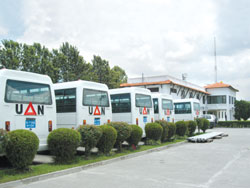|
|
| READY TO GO: UNMIN is sending 40 District Electoral Officers out to the field in two weeks' time to prepare for a November election. The mission currently has 200 staff, mostly arms monitors and electoral advisors, in its five regional offices. |
There's good news and bad about the 22 November date for elections to the constituent assembly.
On the upside, a deal looks imminent with both the janajatis and madhesis. The Nepalese Federation of Indigenous Nationalities is now flexible on its demand for full-proportional representation, the government is listening, and a consensus looks set: a combination of proportional voting and the first-past-the-post ballot system. Some janajati groups with tiny populations could be accommodated in the 17 seats set aside for nominated members to the CA.
MJF central working committee member Upendra Jha is also upbeat about a deal with the government. "Sure, the government can talk to the armed groups first, but the threat of secession is just a bargaining chip," he says." Eventually we'll get exactly what we want in terms of proportional representation."
The resolution of the janajati demands is being seen as another factor in defusing the madhes crisis. "Once they agree on representation, the Tharus and most tarai communities will come over, except the Yadavs and the Muslims" says an analyst.
The Election Commission meanwhile is gearing up to work long days to complete its homework by end-September: laying down rules and regulations, and the code of conduct; staff and monitor selection and training; preparation of voter education and other election-related materials.
Then comes the final push: voter registration, getting officials out to the 240 election areas, fulfilling even part of the EC's ambitious plan to visit every household in the country, printing the ballots, and so on.
Some conditions are fixed. The voter list of about 13.6 million prepared for the proposed June election stands, as does the number of registered parties (62). There's a general agreement that party registration could be reopened if, say, an armed group in the tarai decided to enter mainstream politics.
The EC will need 120,000 staff and 70,000 members of the security forces to conduct the elections to 480 seats simultaneously across the country in this Rs 6 billion exercise. EC officials will come among civil servants, teachers, and semi-governmental organisations.
Law and order remains bad news. The EC is stipulating a 'peaceful' environment for the elections. Election commissioner Nilkantha Uprety says it would be one in which "there are no obstacles to the election process and the workings of the EC, the parties, and voters."
Chief Election Commissioner Bhoj Raj Pokhrel is keeping his eyes peeled. "We will install our own monitoring mechanism to ensure that the security provided by the government matches our expectations in run-up to the elections," he said at a press meet shortly after the announcement of the date.
RELATED ARTICLE
. Full speed ahead



